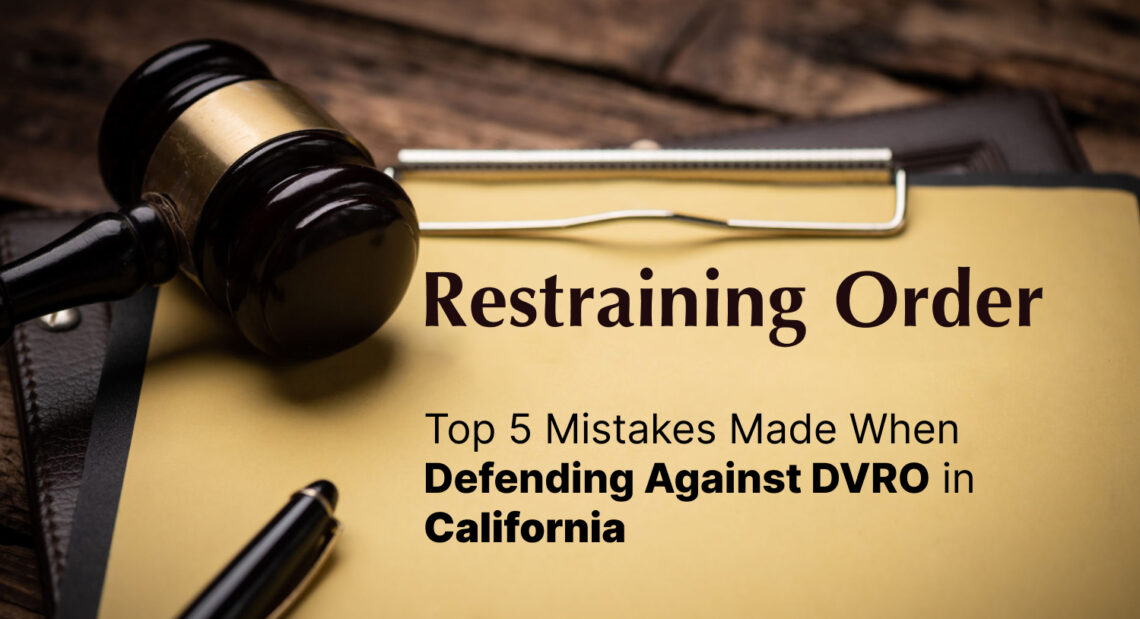A Domestic Violence Restraining Order (DVRO) is a court order meant to protect against abuse or threats of abuse from a spouse, ex-spouse, partner, former partner, family member, or someone they live with. Its impact can be immediate and far-reaching—affecting your liberty, safety planning, parental custody and visitation, immigration exposure, reputation, and even current or future employment.
Defending against DVRO requires careful strategy, but too often, respondents make avoidable mistakes that weaken their case. Understanding these mistakes and ways to avoid them can put you in a stronger legal position and may even support your case.
In this guide, former prosecutor and experienced criminal defense and family law attorney Parag Agrawal highlights the five most common mistakes people make when defending against DVRO and explains their potential consequences and effects.
Mistakes to Avoid When Defending Against a DVRO
1. Ignoring the Hearing or Failing to Respond
The most damaging mistake a person can make is ignoring the hearing or failing to respond to the notice. Some people believe that if they do not attend the court date, the situation will go away on its own. In reality, not attending often results in the court granting the DVRO by default. This means the petitioner’s request is approved without hearing your side of the story. Once granted, the order can limit your freedom in many ways, such as restricting where you can go and whom you can contact.
Another issue is failing to respond properly to the initial notice. The court usually gives a limited time frame to reply. Missing this deadline can prevent you from presenting your defense. Taking the hearing seriously gives you the opportunity to protect your rights and future.
2. Contacting the Petitioner (Even Indirectly)
When faced with a DVRO, many people feel the need to explain themselves directly to the petitioner. They may think a simple conversation can clear up misunderstandings. However, contacting the petitioner, even through a friend or a family member, is one of the biggest mistakes a person can make. Courts usually see this as a violation of the restraining order process. Even indirect contact can be reported and used against you.
Trying to reach out can create the impression that you are not respecting boundaries. Judges may then believe that the petitioner has a valid reason to fear further contact. This can harm your credibility and reduce your chances of successfully defending yourself. In some cases, reaching out can even result in additional legal consequences.
It is important to remember that once a DVRO process begins, communication with the petitioner should only happen through the proper legal channels. If something needs to be addressed, your lawyer can handle it or bring it up in court.
3. Failing to Gather and Present Evidence
Many people believe that simply telling their side of the story will be enough. In reality, courts rely on proof, not just statements. Without evidence, the case often turns into your word against the petitioner’s.
Evidence, such as text messages, emails, social media posts, or phone records, can sometimes show the truth about past interactions. Witnesses who saw or heard certain events can also provide valuable support. Even personal records, like travel receipts or work schedules, can be used to confirm where you were at a certain time. Presenting this kind of information makes your defense stronger and gives the judge a clearer picture of the situation.
4. Losing Control in Court
Court hearings can be stressful and emotional, especially when the subject involves personal relationships. However, one of the most harmful mistakes people make is losing control during the hearing. This may include raising your voice, interrupting others, or showing anger toward the petitioner. Even small signs of frustration can influence how the judge views you.
Judges expect everyone to behave respectfully in the courtroom. Losing your temper can create the impression that you are aggressive or unable to manage emotions. This may unintentionally support the petitioner’s claims, even if they are not true. It can also reduce the judge’s willingness to believe your side of the story.
5. Not Hiring Experienced Counsel
Trying to handle a DVRO case alone is another common mistake. Defending yourself without proper guidance can make the process much harder. DVRO cases often involve detailed rules, strict deadlines, and complex procedures that are difficult to manage without experience.
An experienced attorney understands how to respond to the petition, what evidence is most effective, and how to present your case in court. They can also explain the possible outcomes and prepare you for each step. Having someone skilled on your side increases your chances of success. Without legal support, you may miss important opportunities to defend yourself or make mistakes that harm your case.
What are the Potential Legal Consequences for Violating a DVRO?
A Domestic Violence Restraining Order (DVRO) is a legally binding order that must be followed carefully. Breaking its terms can result in serious outcomes. Below are some of the potential consequences:
- Contempt of Court: Violating the terms of a DVRO is seen as disobeying a direct court order. This can result in fines, penalties, or other sanctions, depending on the situation.
- Arrest by Law Enforcement: Police officers can act immediately if they believe a DVRO has been violated. An arrest can bring stress, damage to your reputation, criminal charges, and create more complications in your case.
- Impact on Custody or Visitation: If there are ongoing family law matters, a violation may weaken your position. Courts often consider compliance with restraining orders when making decisions about child custody and visitation.
- Stronger Restrictions: A violation can lead the court to extend the duration of the DVRO or impose stricter conditions. This means more limitations on your daily life.
Conclusion
Defending against a DVRO requires more than simply denying allegations– it’s about preparing a clear strategy, gathering solid evidence, and presenting yourself in a way that protects both your rights and your future. Even a single mistake can reduce your chances of a fair outcome. This is the moment to take control of your defense, not leave it to chance.
If you are currently facing a DVRO in California, don’t wait. The earlier you act, the better your chances of building an effective defense. Contact the Law Office of Parag Agrawal today to discuss your case, understand your options, and move forward with the guidance of an experienced criminal defense and family law attorney.
Disclaimer: The information provided in this blog is for general informational purposes only and is not intended as legal advice. It is recommended that you consult with a qualified criminal defense attorney to discuss your specific circumstances and receive personalized legal guidance. Parag Agrawal and Law Office of Parag Agrawal do not accept responsibility for any actions taken based on the information provided in this blog.






